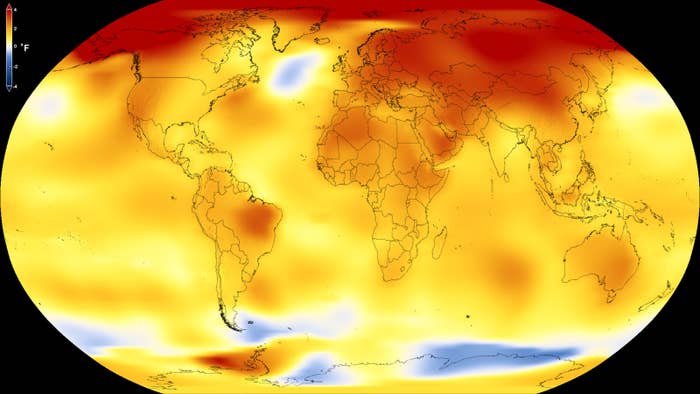
2017 was indisputably hot. But exactly how hot depends on which federal agency you ask.
NASA scientists announced on Thursday that global temperatures last year ranked as the second warmest since record keeping began in 1880. But according to a different analysis released jointly from the National Oceanic and Atmospheric Administration, 2017 was actually the third warmest on record.
The two science agencies differed by 0.1 degrees in this accounting. Why the difference?
The agencies use different analyses for the same task. NASA’s methods take into account inland temperatures in the Arctic — the fastest warming region of the globe — while NOAA’s doesn’t.
“That is very likely the difference we’re seeing this year,” said Deke Arndt, chief of the monitoring branch at NOAA’s National Centers for Environmental Information, on a phone briefing for reporters.
NASA used what’s called the GISS Surface Temperature Analysis to compare 2017 temperatures with baseline temperatures from 1951 to1980. Space agency scientists concluded 2017 was 1.6 degrees Fahrenheit above this baseline's average. (In contrast, NASA found 2016, the warmest year on record, was 1.8 degrees Fahrenheit above the same baseline.)
Meanwhile, NOAA used a different analysis and a different baseline, finding 2017 was about 1.5 degrees Fahrenheit above a 1901 to 2000 average.
“It’s two different approaches,” Arndt said. “One is a little more conservative, one a little more aggressive. They complement each other.”
Regional weather patterns mean that different locations experience different amounts of warming. In the United Stat… https://t.co/kDWlhDgHXB
And both calculations tell the same general story: 2017 was hot, and it’s part of a series of hot years. Specifically, the five warmest years on record have all occurred since 2010, NOAA and NASA agree.
Despite some small differences between the two analyses, “the overall picture is very similar and coherent,” Gavin Schmidt, director of NASA’s Goddard Institute for Space Studies, said on the press call. “We are in a long-term warming trend.”
That’s also the takeaway from a third analysis produced by the United Kingdom’s Met Office, which found 2017 was the third warmest year on record.
2017 was 0.99±0.1°C above pre-industrial levels, making it the 3rd warmest year in the @MetOffice record. If you’ve… https://t.co/vV1gXuGCHM
"Basically all of the warming in the last 60 years is attributed to human activities," and carbon dioxide emissions are the top driver, Schmidt said. And he expects 2018 to be another one for the record books.
This year “is almost certainly a top-five year and possibly another top-two year,” Schmidt said.
“In news that should surprise no one, 2017 was one of the three warmest years on record,” Ed Hawkins, a climate scientist at the University of Reading, wrote on Twitter.
In news that should surprise no-one, 2017 was one of the three warmest years on record. How should we visualise thi… https://t.co/U6ESch8fSl
Last week, federal scientists at NOAA announced that 2017 set a record for big, costly natural disasters in the US and was the third warmest year on record for the nation.

